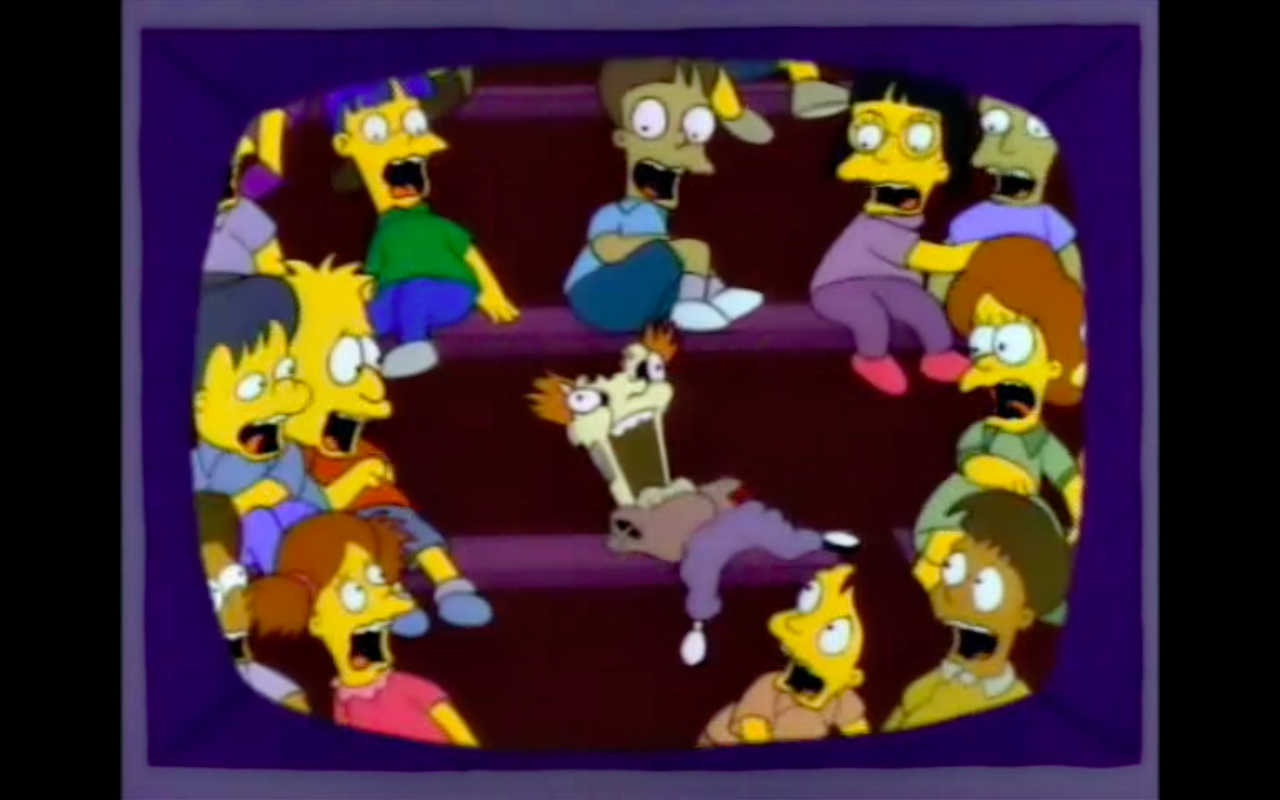"I'd be mortified if someone made a lousy product with the Simpson name on it."
 The changes to The Simpsons don't happen with large, swooping motions separated by individual seasons. It's more of a slow, gradual process seen through the occasional alteration in one character's actions in a few episodes here and there until those decisions become the norm. That's mostly what this season is - it isn't a stark change in attitudes between the indomitable season four (and thankfully it's also not a change in quality, at least not a significant one) but there's a few signs of things in the future that twist the show in a different direction.
The changes to The Simpsons don't happen with large, swooping motions separated by individual seasons. It's more of a slow, gradual process seen through the occasional alteration in one character's actions in a few episodes here and there until those decisions become the norm. That's mostly what this season is - it isn't a stark change in attitudes between the indomitable season four (and thankfully it's also not a change in quality, at least not a significant one) but there's a few signs of things in the future that twist the show in a different direction.
Namely, the family is clearly making a name for themselves in the town of Springfield. In the previous seasons we see this a little bit here and there; Lisa becomes a beauty queen, Dancing Homer sparked some popularity, even Homer being a monorail conductor had him saving a number of people and would garner a bit of attention. Season 5 takes it a little higher. First off, it shows some of Homer's past when he becomes a part of a barbershop quartet that found a very high amount of popularity. This is somewhere either before or after he becomes a grunge musician in later seasons, but that's a different issue altogether. Homer also becomes an astronaut, and although they make light of the fact that no one actually watches space launches, you have to assume that it would be a fairly country-wide thing to send two blundering idiots into space. That, or it's just the Springfield wing of N.A.S.A. deciding to spend some of their budget. Further, Lisa helps to create a doll that was meant to rival Malibu Stacey, the Barbie of the Simpson world - and she's the voice and name for it. Bart finds fame as well, both in when his "do what you feel like" motto is pushed to the forefront of the town with the help of Brad Goodman in "Bart's Inner Child" and in his other saying, "I didn't do it" on Krusty's show that finds him both fame and you have to assume some degree of fortune. The last episode is literally called "Bart Gets Famous".
 As for other gradual changes in the characters, which thus far are still relatively few and far between, we see for the first time one of the main Simpson family characters acts in a negative way and goes without consequence. In "Boy Scouts 'N' the Hood", Homer is a jerk to both Bart and Flanders pretty well the whole time. Usually the episode will end with him pushing it too far or Bart getting fed up, resulting in Homer repenting and ultimately coming through in the end. This time, well... he came through (saving them on a raft that got lost due to his mistakes) but it didn't really show him seeing how he was wrong. He was being a poor father and got no comeuppance for it. While this is only one occasion, it's indicative of the direction the show takes in the years to come. As for right now, we see Homer's redemption come through in "The Last Temptation of Homer" where he refuses to cheat on Marge, and Bart finding his way in "Burns' Heir" where in the end he stands up for his family. Mind you, Bart also threw rocks through Burns' mansion earlier in the episode, an action that eventually rewarded him, but... meh.
As for other gradual changes in the characters, which thus far are still relatively few and far between, we see for the first time one of the main Simpson family characters acts in a negative way and goes without consequence. In "Boy Scouts 'N' the Hood", Homer is a jerk to both Bart and Flanders pretty well the whole time. Usually the episode will end with him pushing it too far or Bart getting fed up, resulting in Homer repenting and ultimately coming through in the end. This time, well... he came through (saving them on a raft that got lost due to his mistakes) but it didn't really show him seeing how he was wrong. He was being a poor father and got no comeuppance for it. While this is only one occasion, it's indicative of the direction the show takes in the years to come. As for right now, we see Homer's redemption come through in "The Last Temptation of Homer" where he refuses to cheat on Marge, and Bart finding his way in "Burns' Heir" where in the end he stands up for his family. Mind you, Bart also threw rocks through Burns' mansion earlier in the episode, an action that eventually rewarded him, but... meh. |
Best Episode:
 |
Best Quotes:
"Life is one crushing defeat after another until you just wish Flanders was dead."
-Homer consoling Apu after losing the Kwik-e-Mart
"I'm a white male, aged eighteen to fourty-nine. Everyone listens to me!"
-Homer after hearing Abe and Lisa complain about the difficulties of being old and young, respectively.
"Dad, I know you're discouraged, but please don't deny the world your fat can."
-Bart after Homer gets in trouble for mooning the crowd at Mr. Burns' birthday
"They don't call me Springfield Fats just because I'm morbidly obese!"
-Homer leaning on Flanders' pool table.






